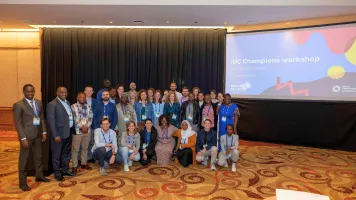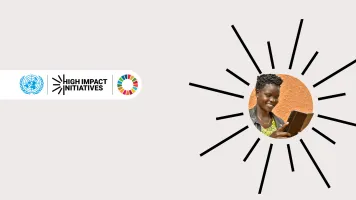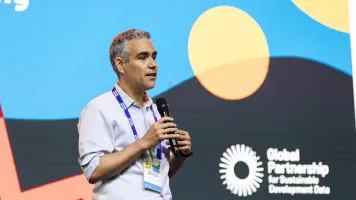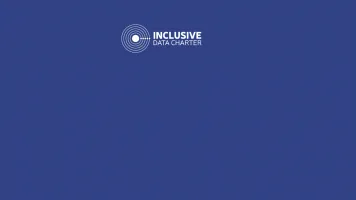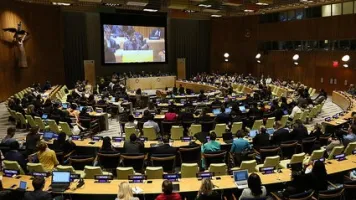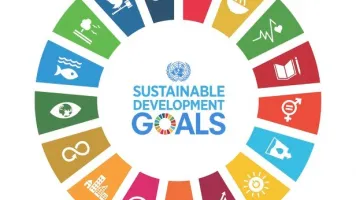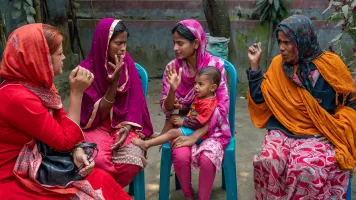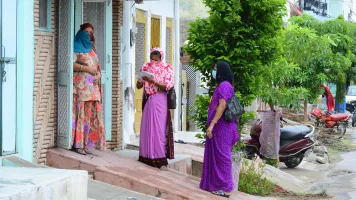The United Nations Children's Fund (UNICEF) promotes the rights and well-being of every child, in everything we do. Together with our partners, we work in 190 countries and territories to translate that commitment into practical action, focusing special effort on reaching the most vulnerable and excluded children, to the benefit of all children, everywhere.
In all of its work, UNICEF takes a life-cycle based approach, recognizing the particular importance of early childhood development and adolescence. UNICEF programmes focus on the most disadvantaged children, including those living in fragile contexts, those with disabilities, those who are affected by rapid urbanization and those affected by environmental degradation.
UNICEF was created with a distinct purpose in mind: to work with others to overcome the obstacles that poverty, violence, disease and discrimination place in a child’s path. We advocate for measures to give children the best start in life because proper care at the youngest age forms the strongest foundation for a person’s future.
Priorities as an Inclusive Data Charter Champion
Effective use of disaggregated data can help us not just track results for children, but also shape those results with better insights about what’s working, what’s not, which children are thriving and which are being left behind. Both the Sustainable Development Goals (SDGs) and UNICEF’s Strategic Plan explicitly recognize the key role of data in achieving results. The ultimate success of each plan will rely on data that are fit-for purpose and put to use for children.
Realigning UNICEF data efforts to address gaps in our current work as well as opportunities on the horizon requires shifts in the focus of some of our data work. Our IDC action plan outlines key areas of work that we will start, stop, reduce and increase.
UNICEF's IDC 2019 Monitoring Report.
Priorities as a partner of the Global Partnership for Sustainable Development Data
UNICEF supports countries in collecting data related to children and women through Multiple Indicator Cluster Surveys (MICS), an international household survey programme. Since its inception in the mid-1990s, five rounds of MICS have been completed (in 1995-1996, 2000-2001, 2005-2006, 2009-2012, 2013-2015) and a sixth is now underway (2016-2018).
The MICS programme is designed to collect statistically sound, internationally comparable data on more than 100 indicators used by countries to assess the situation of children and women in the areas of education, health, gender equality, rights, and protection. It also provides data required to monitor progress towards national and international goals and commitments aimed at promoting the welfare of children. As part of the MICS global programme, UNICEF provides technical support and training through a series of regional workshops covering questionnaire content, sampling and survey implementation, data processing, data quality and analysis, report writing, data archiving and dissemination and further analysis. During the last two rounds of MICS, close to 1,400 UNICEF staff and experts from developing countries were trained worldwide.
Multiple Indicator Cluster Surveys generated data on more than 20 indicators used to measure progress towards the Millennium Development Goals (MDGs), making the programme one of the largest single sources of data for MDG monitoring. The data generated in the fifth round of MICS (along with other nationally representative household surveys) was critically important in the final assessment of the MDGs, which was launched by the United Nations Secretary-General in September 2015.
The MICS programme has pioneered the development and implementation of new measurement tools in areas such as early childhood development, female genital mutilation/cutting, child discipline, hand washing, post-natal health care, low birthweight, and rapid water quality testing. Many of these tools have also been adopted by other household survey programmes.
Data Analysis
Compiling data
UNICEF maintains a series of global databases for tracking the situation of children and women globally. The databases include only statistically sound and nationally representative data from household surveys and other sources. They are updated annually through a process that draws on a wealth of data maintained by UNICEF’s network of 140 country offices.
Developing new methodologies
UNICEF plays an active – often leadership – role in a number of inter-agency monitoring groups on specific topics. Together with its inter-agency partners, UNICEF helps devise new methodologies, indicators and monitoring tools, build statistical capacity at the country level, develop joint estimates, and harmonize monitoring work across partners. UNICEF has also led the development of new indicators and methodologies for gathering relevant data on a number of priority issues, including education, child labour, child disability, child mortality, maternal mortality, water and sanitation, low birthweight, antenatal care, pneumonia, malaria, iodine deficiency disorder, female genital mutilation/cutting, and vitamin A deficiency.
Assessing progress towards international goals
UNICEF has undertaken extensive work on the development of indicators for national and international development goals and targets related to the well-being of children and women. These successful efforts include monitoring progress towards the Millennium Declaration and the MDGs, the World Fit for Children Declaration and Plan of Action, the United Nations General Assembly Special Session on HIV/AIDS and the African Summit on Malaria. UNICEF is spearheading the development of child survival indicators currently used in the Countdown to 2015 initiative.
Analysing data for evidence-based programming
UNICEF’s work in the area of data analysis highlights trends and emphasizes patterns found within the data. It also suggests how these data can be used strategically to inform programmatic efforts. Where possible, data are disaggregated by gender, age, residence, household income, education, and other key social and demographic variables to help uncover possible risk factors and inequities. UNICEF also promotes the advancement of research through the development of joint projects and collaboration with academic institutions and other agencies working at the national and international level.
Building capacity
Through its MICS programme, UNICEF provides in-country technical assistance and leadership to local researchers and organizations, thereby contributing to the improvement of national monitoring systems for children and women. UNICEF also conducts regional workshops on specialized topics in conjunction with government counterparts to enhance their capacity to understand, interpret, analyze, disseminate and use statistics. These workshops cover several objectives ranging from supporting further analysis of malaria data for improved programme monitoring and management and for policy formulation and harmonizing the methodologies used to derive estimates on access to water and sanitation to improving coverage estimates related to HIV and to child and maternal mortality.
Data Dissemination
Researchers, programme managers and legislators worldwide count on UNICEF data to assess the situation of women and children and to plan and implement related policies and programmes. The media, both locally and internationally, also rely on such data to inform and substantiate their coverage of children and women and the issues that affect their lives.
Publications
UNICEF data are used for a variety of planning and monitoring purposes. They appear in UNICEF flagship publications such as The State of the World’s Children and Committing to Child Survival: A promise renewed and in a number of sector-specific reports. These include Progress on Drinking Water and Sanitation; Malaria and Children; and Female Genital Mutilation/Cutting: A statistical overview and exploration of the dynamics of change.
MICS dissemination tools
Tools produced to disseminate MICS data at the country and regional levels include printed materials, presentations, web links and those focusing on the media. Selected country examples are presented here.
DevInfo
DevInfo supports UN member states in their use of national statistics for evidence-based policy and planning dialogues. At its core, the DevInfo programme revolves around a database system that provides a method to organize, store and display data in a uniform format that facilitates data access at the country level among government institutions, their development partners, and the general public.
DevInfo is an integrated desktop and web-enabled tool that assists countries in their reporting on national and international targets such as the MDGs. It relies on user-friendly features designed for producing tables, graphs, maps and other visual outputs for inclusion in reports, presentations and various advocacy or planning materials. The software supports standard indicators, such as those used for monitoring the MDGs at the global level, yet can also be customized to fit the requirements of local indicator and monitoring frameworks at the regional or country level.
DevInfo is managed by UNICEF’s Division of Data, Research and Policy on behalf of the UN system. The latest version, DI 7.0 (http://www.devinfo.org/) features many new enhancements over previous versions, including:
- Access: DevInfo 7.0 is entirely online, meaning that users can access available datasets from the convenience of their web-enabled desktop, laptop or mobile browser.
- Catalog: DevInfo 7.0 features an online, searchable country catalog. Countries have the option of hosting their data on devinfo.org in order to facilitate broad access to their datasets.
- My Data: Easily prepare maps, graphs and other data visualizations by simply pasting your data into a box.
- Gallery: Save presentation objects to a personal online gallery. Create public galleries for databases that you administer.
- Share: Share visualization outputs with others via social media, email or page embedding.


